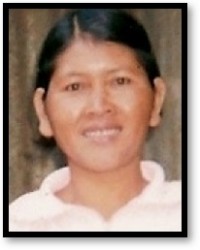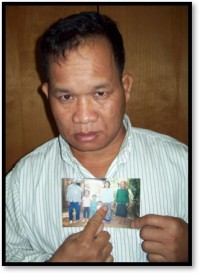By Scott Johnson ——Bio and Archives--November 22, 2009
American Politics, News | CFP Comments | Reader Friendly | Subscribe | Email Us
 The US State Department’s October 2009 report on Vietnam’s religious freedom sheds little light on the realities facing America’s former allies, the Montagnards. In fact the report stands out as a testament of betrayal.
Puih Hbat for example is a Christian woman who was arrested by Vietnamese authorities in 2008 for the “crime” of conducting unauthorized prayer services. She is from the indigenous Montagnard ethnic group (a people also referred to as hill tribes or Degar people) who reside in Vietnam’s Central Highlands and also a mother of four children.
The US State Department’s October 2009 report on Vietnam’s religious freedom sheds little light on the realities facing America’s former allies, the Montagnards. In fact the report stands out as a testament of betrayal.
Puih Hbat for example is a Christian woman who was arrested by Vietnamese authorities in 2008 for the “crime” of conducting unauthorized prayer services. She is from the indigenous Montagnard ethnic group (a people also referred to as hill tribes or Degar people) who reside in Vietnam’s Central Highlands and also a mother of four children. Its no secret the State Department has sidelined the Montagnard issue in lieu of trade deals and strategic relations with Hanoi. Further, the fact that Montagnard Christians refuse to join government sanctioned Churches complicates diplomacy making it convenient to ignore their former ally. Year after year however, the US Commission of International Religious Freedom (USICRF) calls for Vietnam be designated on the watch list of nations that commit religious persecution and yet the State Department resists doing so. US Ambassador to Vietnam Michael Michalak even recently claimed there is not enough evidence of religious persecution in Vietnam.
Thus, Puih Hbat has been relegated to another one of the many forgotten casualties inflicted on Vietnam’s indigenous people. Her story however, dates back to when the Central Highlands of Vietnam was a strategic battleground of the Vietnam War. This region, Vietnam’s western mountains is the ancestral homelands of the Montagnards and would become the Ho Chi Minh Trail. The Trial extended into Laos and Cambodia forming the supply lines from the communist north to South Vietnam. It was here that America recruited the Montagnards in the war against communism.
Military documents indicate that at any one time some 30 to 40,000 Montagnards served with US forces and throughout the Vietnam War it is likely 100,000 fought as allies with America. By the end of the conflict however, one quarter of the Montagnard population perished, some 200,000 people including half the adult males who died fighting communism.
Puih Hbat’s people were decimated in the ravages of war only to face a genocidal revenge when the communists took over South Vietnam. In 1975 Hanoi unleashed their socialist inspired “ethnic cleansing” against these people and Montagnard leaders and pastors were executed while untold thousands imprisoned in re-education camps. The Montagnard population was then subjected to forced relocations and driven off their ancestral lands. This deliberate marginalization saw the Montagnards suffer like indigenous peoples the world over experienced under European colonization. In the words of Human Rights Watch, “The Montagnards have been repressed for decades.”
Today, Vietnam continues a strict security presence over the Montagnard population while implementing policies to eliminate Christian house churches. Security forces strictly limit movements within Montagnard villages and monitor cell phone communications to prevent word of human rights abuses reaching the outside world. One Montagnard named Y Ngo Adrong for example was beaten to death by police in 2006 for using a cell phone. The Vietnamese military even purchased cell phone monitoring equipment from US and UK companies. Prophetically some of this equipment goes by the trade name of “the silver bullet” spy system.
Puih Hbat however, wasn’t using a cell phone when she was arrested. She had only conducted prayer services in her home and days before her arrest her entire village was threatened by police to cease religious activities. A few days later in the dead of night, on April 11, 2008 eight police and soldiers stormed into her house and threw her screaming into a truck. Puih Hbat was taken to Ia Gra district prison. She may have later been transferred to T-20 prison in Pleiku but to date her family have no idea if she is alive.
In October 2009 I travelled to North Carolina and visited the exiled Montagnard community where Puih Hbat’s husband, Hre Rahlan lives. He had escaped from Vietnam a few years ago and granted asylum in US as a refugee. At their weekend service some 1000 Montagnards gathered their large Church in Greensboro. Many of the congregation were recent émigrés who described how their relatives back in Vietnam still suffered. The Montagnards here however, were free from attacks by Vietnam’s security police and their “youth choir” sung beautiful Christian hymns in their ancient languages.
One night in the Church I sat down with Hre Rahlan and he described how his wife was arrested for leading prayer services. His eldest son, a teenager also had been arrested by police who beat and threatened him about his mother’s Christian beliefs. Today his four children live with their grandmother back in Vietnam and were only recently allowed to return to school. Hre Rahlan sat quietly describing how he missed his wife and children and I also found out an interesting fact about Puih Hbat – her father had served with the US military during the Vietnam War.
Its no secret the State Department has sidelined the Montagnard issue in lieu of trade deals and strategic relations with Hanoi. Further, the fact that Montagnard Christians refuse to join government sanctioned Churches complicates diplomacy making it convenient to ignore their former ally. Year after year however, the US Commission of International Religious Freedom (USICRF) calls for Vietnam be designated on the watch list of nations that commit religious persecution and yet the State Department resists doing so. US Ambassador to Vietnam Michael Michalak even recently claimed there is not enough evidence of religious persecution in Vietnam.
Thus, Puih Hbat has been relegated to another one of the many forgotten casualties inflicted on Vietnam’s indigenous people. Her story however, dates back to when the Central Highlands of Vietnam was a strategic battleground of the Vietnam War. This region, Vietnam’s western mountains is the ancestral homelands of the Montagnards and would become the Ho Chi Minh Trail. The Trial extended into Laos and Cambodia forming the supply lines from the communist north to South Vietnam. It was here that America recruited the Montagnards in the war against communism.
Military documents indicate that at any one time some 30 to 40,000 Montagnards served with US forces and throughout the Vietnam War it is likely 100,000 fought as allies with America. By the end of the conflict however, one quarter of the Montagnard population perished, some 200,000 people including half the adult males who died fighting communism.
Puih Hbat’s people were decimated in the ravages of war only to face a genocidal revenge when the communists took over South Vietnam. In 1975 Hanoi unleashed their socialist inspired “ethnic cleansing” against these people and Montagnard leaders and pastors were executed while untold thousands imprisoned in re-education camps. The Montagnard population was then subjected to forced relocations and driven off their ancestral lands. This deliberate marginalization saw the Montagnards suffer like indigenous peoples the world over experienced under European colonization. In the words of Human Rights Watch, “The Montagnards have been repressed for decades.”
Today, Vietnam continues a strict security presence over the Montagnard population while implementing policies to eliminate Christian house churches. Security forces strictly limit movements within Montagnard villages and monitor cell phone communications to prevent word of human rights abuses reaching the outside world. One Montagnard named Y Ngo Adrong for example was beaten to death by police in 2006 for using a cell phone. The Vietnamese military even purchased cell phone monitoring equipment from US and UK companies. Prophetically some of this equipment goes by the trade name of “the silver bullet” spy system.
Puih Hbat however, wasn’t using a cell phone when she was arrested. She had only conducted prayer services in her home and days before her arrest her entire village was threatened by police to cease religious activities. A few days later in the dead of night, on April 11, 2008 eight police and soldiers stormed into her house and threw her screaming into a truck. Puih Hbat was taken to Ia Gra district prison. She may have later been transferred to T-20 prison in Pleiku but to date her family have no idea if she is alive.
In October 2009 I travelled to North Carolina and visited the exiled Montagnard community where Puih Hbat’s husband, Hre Rahlan lives. He had escaped from Vietnam a few years ago and granted asylum in US as a refugee. At their weekend service some 1000 Montagnards gathered their large Church in Greensboro. Many of the congregation were recent émigrés who described how their relatives back in Vietnam still suffered. The Montagnards here however, were free from attacks by Vietnam’s security police and their “youth choir” sung beautiful Christian hymns in their ancient languages.
One night in the Church I sat down with Hre Rahlan and he described how his wife was arrested for leading prayer services. His eldest son, a teenager also had been arrested by police who beat and threatened him about his mother’s Christian beliefs. Today his four children live with their grandmother back in Vietnam and were only recently allowed to return to school. Hre Rahlan sat quietly describing how he missed his wife and children and I also found out an interesting fact about Puih Hbat – her father had served with the US military during the Vietnam War.
View Comments
Scott Johnson is a lawyer, writer and human rights activist who has focused on issues in South East Asia.